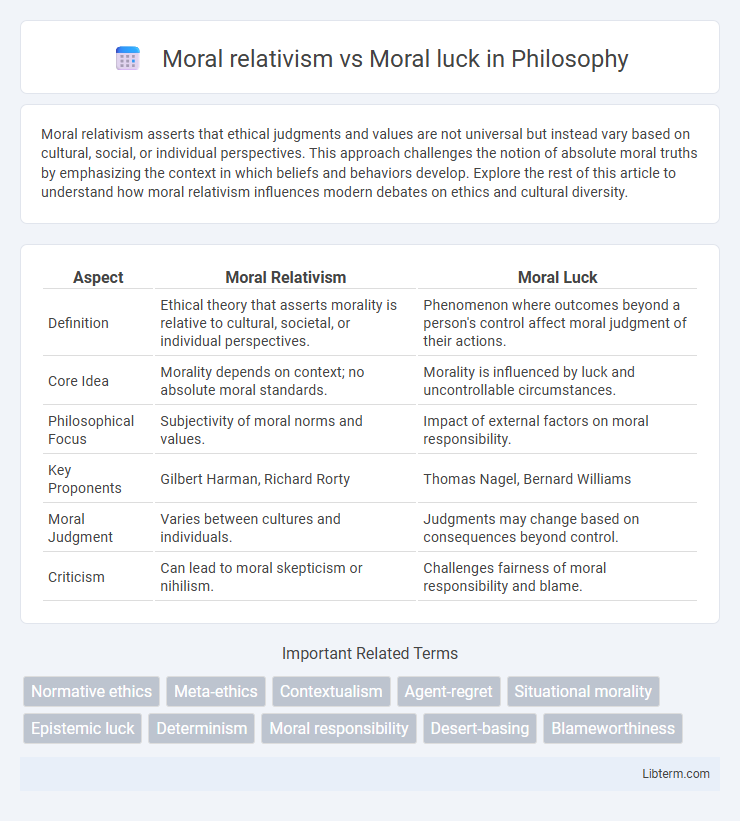Moral relativism asserts that ethical judgments and values are not universal but instead vary based on cultural, social, or individual perspectives. This approach challenges the notion of absolute moral truths by emphasizing the context in which beliefs and behaviors develop. Explore the rest of this article to understand how moral relativism influences modern debates on ethics and cultural diversity.
Table of Comparison
| Aspect | Moral Relativism | Moral Luck |
|---|---|---|
| Definition | Ethical theory that asserts morality is relative to cultural, societal, or individual perspectives. | Phenomenon where outcomes beyond a person's control affect moral judgment of their actions. |
| Core Idea | Morality depends on context; no absolute moral standards. | Morality is influenced by luck and uncontrollable circumstances. |
| Philosophical Focus | Subjectivity of moral norms and values. | Impact of external factors on moral responsibility. |
| Key Proponents | Gilbert Harman, Richard Rorty | Thomas Nagel, Bernard Williams |
| Moral Judgment | Varies between cultures and individuals. | Judgments may change based on consequences beyond control. |
| Criticism | Can lead to moral skepticism or nihilism. | Challenges fairness of moral responsibility and blame. |
Understanding Moral Relativism
Moral relativism asserts that ethical judgments and values vary based on cultural, societal, or individual perspectives, making morality context-dependent rather than absolute. This framework challenges universal moral principles by emphasizing that what is considered right or wrong differs across communities and historical periods. Understanding moral relativism involves recognizing the diversity of moral standards and the influence of social and cultural factors on ethical decision-making.
The Concept of Moral Luck
The concept of moral luck challenges traditional views of moral responsibility by suggesting that factors beyond an individual's control can influence the moral judgment of their actions. Moral luck occurs when the outcome or circumstances surrounding an action affect how morally praiseworthy or blameworthy the agent is judged, despite the agent having the same intentions or decisions. This concept highlights tensions in moral relativism, as it questions the objectivity of moral evaluations based solely on character or intent.
Historical Contexts of Moral Relativism
Moral relativism emerged prominently in the 20th century, influenced by the works of anthropologists like Franz Boas and philosophers such as Ruth Benedict who emphasized cultural diversity in ethical values. This historical context challenged Enlightenment ideas of universal moral principles by highlighting that moral norms are shaped by social, historical, and environmental factors unique to each culture. The debate gained momentum as moral luck questioned individual moral responsibility by showing how outcomes beyond a person's control affect moral judgment.
Types of Moral Luck
Moral luck is categorized into four types: resultant luck, which concerns the outcomes of one's actions; circumstantial luck, involving the situations individuals face; constitutive luck, related to one's inherent traits and dispositions; and causal luck, stemming from preceding events influencing decisions. These types challenge moral relativism by emphasizing that factors beyond personal control affect moral judgment, complicating the notion of fixed ethical standards. Understanding these distinctions deepens analysis of moral accountability within varying contexts of luck and relativism.
Key Philosophers in the Debate
Moral relativism, championed by philosophers like Gilbert Harman and Ruth Benedict, asserts that moral judgments are contingent on cultural or individual perspectives, denying universal moral truths. In contrast, Bernard Williams and Thomas Nagel emphasize moral luck, highlighting how uncontrollable external factors influence moral responsibility and outcomes. The debate centers on whether morality is fluid and context-dependent or if it can be objectively assessed despite the influence of luck.
Moral Judgments Across Cultures
Moral relativism posits that moral judgments vary based on cultural contexts, emphasizing that ethical norms are not absolute but culturally dependent. In contrast, moral luck challenges the fairness of moral evaluations by suggesting that factors beyond an individual's control can influence the moral assessment of actions. Examining moral judgments across cultures highlights the complexity of ethical standards, revealing how both cultural perspectives and uncontrollable circumstances shape notions of right and wrong.
Case Studies Illustrating Moral Luck
Case studies illustrating moral luck reveal how external factors beyond an individual's control influence moral judgment, challenging the absoluteness of ethical responsibility. An infamous example involves drunk driving incidents where two drivers behave identically, but only one causes an accident due to unpredictable circumstances, raising questions about moral blameworthiness. These scenarios highlight the tension between moral relativism's flexible ethical standards and the deterministic aspects embedded in moral luck, complicating the evaluation of actions and outcomes.
Criticisms of Moral Relativism
Moral relativism faces criticism for undermining universal ethical standards, leading to potential justification of harmful practices based on cultural or individual perspectives. Critics argue that it neglects moral accountability, as it cannot adequately address situations where outcomes depend on luck rather than intentional actions, a problem highlighted by the concept of moral luck. This gap challenges the reliability of moral relativism in providing consistent and objective guidance across different contexts.
Implications for Ethical Responsibility
Moral relativism suggests ethical responsibility varies across cultures, emphasizing context-dependent judgments rather than universal standards. In contrast, moral luck challenges the fairness of assigning blame or praise by highlighting factors beyond an individual's control that impact moral outcomes. These differing views complicate legal and social accountability by questioning whether responsibility should hinge on intent alone or also on uncontrollable circumstances.
Bridging Moral Relativism and Moral Luck
Bridging moral relativism and moral luck involves examining how cultural and situational factors influence ethical judgments. Moral relativism asserts that morality depends on cultural norms and perspectives, while moral luck highlights the impact of uncontrollable external circumstances on moral responsibility. Integrating these concepts reveals how varying contexts shape both the standards we use to judge actions and the outcomes that determine moral praise or blame.
Moral relativism Infographic

 libterm.com
libterm.com